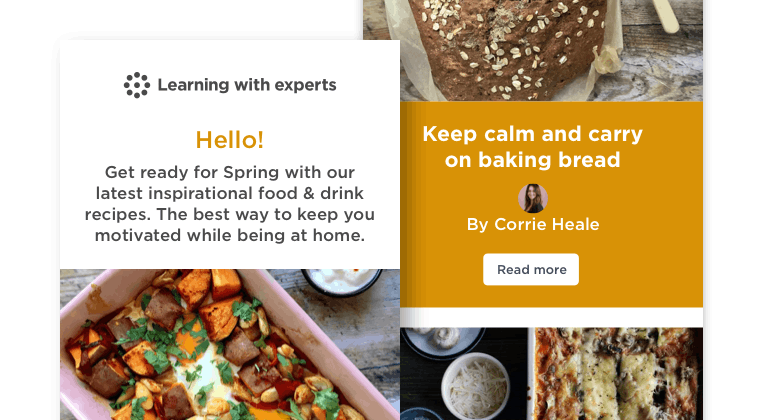The Science of Baking
By Elizabeth Atia •
We’re now over halfway through week two of the UK’s lockdown in a bid to help flatten the pandemic curve. If my food blog website traffic is anything to go by, people are really getting into the baking zone to help pass the time. Who knew there were so many hours in the day to fill! It’s all about the home baking right now (and streaming digital television!). It’s funny how in times of stress and upset food is one of the first things we turn to.
The process of creating something to eat from scratch can be incredibly therapeutic. Enjoying a special treat with your loved ones is a very good way to bring a little moment of happiness into what can be a very long, stressful day.
Baking is a great opportunity to learn new skills, practice techniques and there’s cake and cookies to eat at the end of it!
I’ve been using this lockdown time to encourage my own children to learn how to cook and bake. Homeschooling Economics 101, quarantine style. Mostly, this involves me thrusting a recipe in their general direction and letting them have at while I attempt to get some paid work finished. Working from home and homeschooling at the same time is proving to be a rather interesting juggling act.
Not only is baking a good way to learn new skills, but it’s also a science. Flour, sugar and fat work together in certain ratios to create specific recipes. Every ingredient has a purpose.
Flour gives a bake its structure. There are two types of protein in flour, glutenin and gliadin, and when these proteins come into contact with the liquid in a recipe, they combine to form a gluten network. Gluten is elastic, and it works a bit like a balloon, allowing the ingredients to expand when in the presence of a raising agent like yeast or bicarbonate of soda. It’s important to keep the ratio of flour and raising agent correct, as too much of either can drastically change the resulting bake- too much flour can result in hard cookies or a cake that cracks on the top.
Eggs are the binding agent in a recipe, binding the flour, fat and sugar together. When the proteins in eggs are heated, they open up and turn the batter into a semi-solid state.They also create softness and moistness in baked goods.
Fat is a softening agent, making homebakes less chewy. The type and quantity of fat you use will have a significant effect on the texture, flavour and moistness of your recipe. Fat coats the proteins in the flour, preventing some of them from forming gluten. It also acts as a leavening agent when creamed with sugar, helping to support the air bubbles created by the raising agents of a recipe.
Bicarbonate of soda and baking powder are common raising agents. When combined with wet ingredients these leavening agents create carbon dioxide bubbles which then get trapped in the batter. This results in light and fluffy bakes, but make sure you use a raising agent that isn’t too old. If you’ve had that jar of baking soda or baking powder open in the back of the cupboard for longer than six months it might be a good idea to replace it with a new one. Leavening agents work best for six months after opening.
Sugar is a sweetener but it also helps keep our bakes moist by bonding with the water in the batter.It is also responsible for giving home bakes their distinctive nutty, caramelized flavour.
Tips for baking
Follow the recipe exactly – don’t be tempted to swap ingredients until you are more experienced.
Make sure you measure out your ingredients accurately- invest in a decent set of electronic scales.
Don't over mix –this can work the gluten in the flour too much resulting in a stodgy bake.
Don’t open the oven door to check if the recipe has cooked as you’ll reduce the oven temperature. Opening the door might also cause your cake to sink in the middle!
Use a circle of baking paper on the bottom of your cake tin to ensure the cake doesn’t stick to the pan.
Learning with Experts has a variety of online courses to help keep you motivated while you are at home. Why not try their BBC Good Food Essential Skills for Home Cooks series, or the Introduction to Bread Making?
Have a browse through their Food & Drink courses as something may inspire you! https://www.learningwithexperts.com/foodanddrink
Meantime, happy baking and stay safe!
Stay updated
Receive free updates by email including special offers and new courses.

